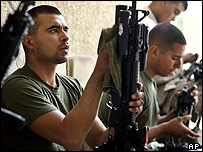| US extends troops' time in Iraq |
| The US Defense Department has said that 6,500 US troops have had their tours of duty in Iraq extended by two months. |
| Tuesday, November 2, 2004 |
The move is being made in order to boost troop numbers and capabilities ahead
of Iraqi elections in January.  A car bomb outside the education ministry in Baghdad has killed at least five people, reports say. West of Baghdad, US artillery and jets have been striking what US military officials believe are insurgent targets in Falluja and Ramadi. Guards freed Civilians have been fleeing Falluja through the night, reports say. Iraqi Prime Minister Iyad Allawi has warned the city faces a military assault if it fails to give up foreign fighters the US military and Iraqi government say are sheltering there. However, interim Iraq President Ghazi Yawer has said he opposes any military solution to the stand-off between US forces and insurgents in the Sunni-dominated city. Meanwhile, two Iraqi guards abducted along with several foreigners in Baghdad on Monday have been released, Iraqi police said. A US citizen, a Nepali and two other Iraqi guards are still being held hostage after gunmen stormed their house in the upmarket Mansour district. Government targeted Tuesday's car bomb in Baghdad is said to have killed five people outside the education ministry and badly damaged the building. Two of the dead are thought to be women. The BBC's Claire Marshall in Baghdad says any symbol or person associated with the interim Iraqi government is a target of the insurgents. Monday saw the assassination of Baghdad's deputy governor in an armed ambush on his car. Modest increase Some 6,500 troops who were due to have returned before the Iraqi election scheduled for January are to have their tours of duty extended by between 30 and 60 days. Keeping troops in a combat zone longer than originally planned is never popular with the soldiers themselves, says the BBC's Pentagon correspondent, Nick Childs. But Pentagon officials say these units were chosen in part because they were originally slated for tours of only 10 months, so extending them will not break the 12-month limit the Pentagon has been aiming at for the maximum length of missions in Iraq. The key motivation, according to Pentagon officials, is to keep experienced units in the country during what will be a critical period. These are 3,500 troops from the 2nd Brigade of the 1st Cavalry Division and 3,000 personnel from the headquarters unit from the 1st Infantry Division. One of their replacement units - the headquarters unit for the 42nd Infantry Division - is being delayed, so the net effect will be to increase troop numbers by a relatively modest 3,500. Sophisticated insurgency According to the latest official Pentagon figures, there are currently about 134,000 US troops in Iraq, as well as about 25,000 other coalition forces. With the normal troop rotations that are going on, which allow for some overlap of forces, Pentagon officials are suggesting that there may be up to 142,000 US troops in Iraq by January. This is all a far cry from the Pentagon planners' hopes at the beginning of the year, our correspondent says. Now Pentagon officials - from Defence Secretary Donald Rumsfeld down - concede that the insurgency has become both more widespread and sophisticated than they had anticipated. |
| http://news.bbc.co.uk/2/hi/americas/3973779.stm |